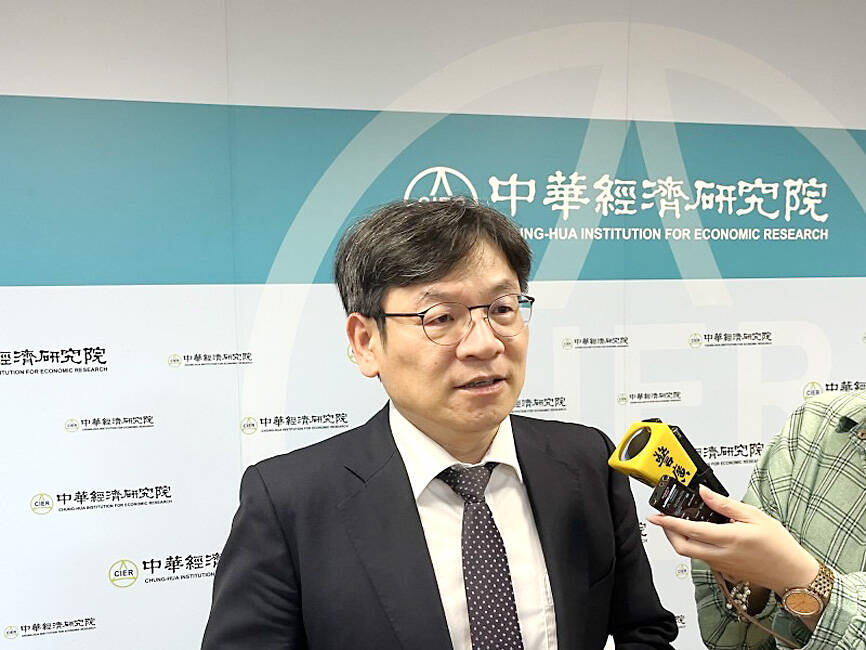The official manufacturing purchasing managers’ index (PMI) last month edged down 0.3 points to 46.8, falling for nine straight months, as companies remained cautious in the face of economic uncertainty, Chung-Hua Institution for Economic Research (CIER, 中華經濟研究院) said yesterday.
“Most constituents of the index moved by less than 1 point,” virtually unchanged from the previous month,” CIER president Yeh Chun-hsien (葉俊顯) told reporters.
PMI data aspire to capture the manufacturing industry’s health, with values of 50 and higher indicating expansion and scores lower than the threshold suggesting contraction.

Photo: Hsu Tzu-ling, Taipei Times
Although companies are still looking for clearer signs of a recovery, they are less pessimistic about business prospects in the coming six months, Yeh said.
The critical subindex of new business orders edged up 0.3 points to 48.6, closer to the neutral mark, as companies in the biotechnology, food and textile, as well as raw materials, saw business pick up, while other sectors remained weighed down by tepid end-market demand, CIER’s monthly survey found.
The reading on industrial production lost 1.2 points to 48.2, as some manufacturers cut capacity to save on operating costs. As a result, the employment measure dropped a mild 0.7 points to 47.9, the institute said.
The subindex on inventory declined an insignificant 0.1 points, while the measure on clients’ inventory fell 3.1 points to 41.6, reflecting a conservative and frugal attitude, the Taipei-based think tank said.
Although the worst is likely over, a concrete recovery remains elusive in terms of order visibility and other PMI data, Yeh said.
The value for the six-month business outlook gained 2.7 points to 42.5, it said.
Yeh attributed the sentiment uptick to China’s announcement of stimulus measures to bolster infrastructure, which would benefit local firms focused on the Chinese market.
The S&P Global Taiwan Manufacturing PMI reached similar observations, coming in at 48.3 last month from 47.6 in October.
The downturn in Taiwan’s manufacturing sector continued to ease, as companies exercised caution when making purchases to grapple with muted demand, S&P economics associate director Annabel Fiddes said, adding that the subdued demand placed a lid on price hikes for the time being, although inflationary pressures returned.
The nation’s non-manufacturers fared better with the non-manufacturing index (NMI) gaining 3 points to 56.2, the highest since August last year and expanding for 13 consecutive months, the institute said.
The tourism and hospitality sectors are looking forward to seasonally high sales linked to traditional year-end feasts and employee travel for the first time in four years without COVID-19 disruptions, Yeh said.
The TAIEX’s rally further shored up businesses for fund management and securities houses, the institute said.

When an apartment comes up for rent in Germany’s big cities, hundreds of prospective tenants often queue down the street to view it, but the acute shortage of affordable housing is getting scant attention ahead of today’s snap general election. “Housing is one of the main problems for people, but nobody talks about it, nobody takes it seriously,” said Andreas Ibel, president of Build Europe, an association representing housing developers. Migration and the sluggish economy top the list of voters’ concerns, but analysts say housing policy fails to break through as returns on investment take time to register, making the

‘SILVER LINING’: Although the news caused TSMC to fall on the local market, an analyst said that as tariffs are not set to go into effect until April, there is still time for negotiations US President Donald Trump on Tuesday said that he would likely impose tariffs on semiconductor, automobile and pharmaceutical imports of about 25 percent, with an announcement coming as soon as April 2 in a move that would represent a dramatic widening of the US leader’s trade war. “I probably will tell you that on April 2, but it’ll be in the neighborhood of 25 percent,” Trump told reporters at his Mar-a-Lago club when asked about his plan for auto tariffs. Asked about similar levies on pharmaceutical drugs and semiconductors, the president said that “it’ll be 25 percent and higher, and it’ll

NOT TO WORRY: Some people are concerned funds might continue moving out of the country, but the central bank said financial account outflows are not unusual in Taiwan Taiwan’s outbound investments hit a new high last year due to investments made by contract chipmaker Taiwan Semiconductor Manufacturing Co (TSMC, 台積電) and other major manufacturers to boost global expansion, the central bank said on Thursday. The net increase in outbound investments last year reached a record US$21.05 billion, while the net increase in outbound investments by Taiwanese residents reached a record US$31.98 billion, central bank data showed. Chen Fei-wen (陳斐紋), deputy director of the central bank’s Department of Economic Research, said the increase was largely due to TSMC’s efforts to expand production in the US and Japan. Investments by Vanguard International

WARNING SHOT: The US president has threatened to impose 25 percent tariffs on all imported vehicles, and similar or higher duties on pharmaceuticals and semiconductors US President Donald Trump on Wednesday suggested that a trade deal with China was “possible” — a key target in the US leader’s tariffs policy. The US in 2020 had already agreed to “a great trade deal with China” and a new deal was “possible,” Trump said. Trump said he expected Chinese President Xi Jinping (習近平) to visit the US, without giving a timeline for his trip. Trump also said that he was talking to China about TikTok, as the US seeks to broker a sale of the popular app owned by Chinese firm ByteDance Ltd (字節跳動). Trump last week said that he had